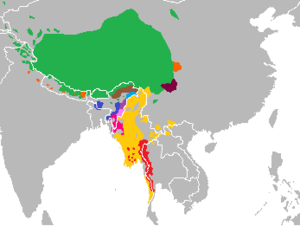Himalayish
| Tibeto-Burman | |
|---|---|
| Geographic distribution: |
Southeast Asia, East Asia, South Asia |
| Linguistic classification: |
Sino-Tibetan
|
| Proto-language: | Proto-Tibeto-Burman |
| Subdivisions: |
|
| ISO 639-5: | |
| Glottolog: | None |

|
|
The Tibeto-Burman languages are the non-Sinitic members of the Sino-Tibetan language family, over 400 of which are spoken throughout the highlands of Southeast Asia as well as certain parts of East Asia and South Asia. The name derives from the most widely spoken of these languages, namely Burmese (over 32 million speakers) and the Tibetic languages (over 8 million). These languages also have extensive literary traditions, dating from the 12th and 7th centuries respectively. Most of the other languages are spoken by much smaller communities, and many of them have not been described in detail.
Some taxonomies divide Sino-Tibetan into Sinitic and Tibeto-Burman branches (e.g. Benedict, Matisoff). However, other scholars deny that Tibeto-Burman comprises a monophyletic group. Van Driem argues that the Sino-Tibetan family should be called "Tibeto-Burman", but this usage has not been widely adopted. Others exclude a relationship with Chinese altogether (e.g. Beckwith, R. A. Miller).
During the 18th century, several scholars noticed parallels between Tibetan and Burmese, both languages with extensive literary traditions. In the following century, Brian Houghton Hodgson collected a wealth of data on the non-literary languages of the Himalayas and northeast India, noting that many of these were related to Tibetan and Burmese. Others identified related languages in the highlands of southeast Asia and southwest China. The name "Tibeto-Burman" was first applied to this group in 1856 by James Logan, who added Karen in 1858. Charles Forbes viewed the family as uniting the Gangetic and Lohitic branches of Max Müller's Turanian, a huge family consisting of all the Eurasian languages except the Semitic, "Aryan" (Indo-European) and Chinese languages. The third volume of the Linguistic Survey of India was devoted to the Tibeto-Burman languages of British India.
...
Wikipedia
